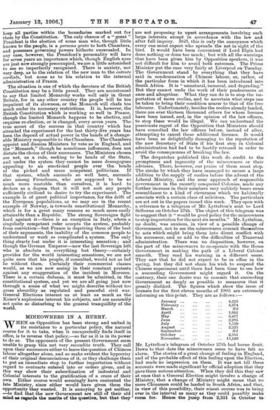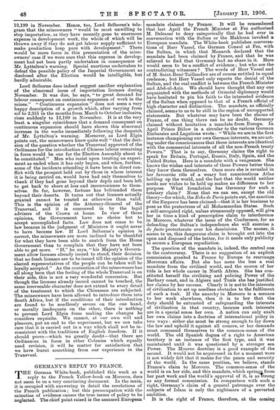MINEOWNERS IN A HURRY.
WHEN an Opposition has been strong and united in its resistance to a particular policy, the natural course for it to take, when it unexpectedly finds itself in office, is to reverse that policy,—so far as it is in its power to do so. The opponents of the present Government seem unable to grasp this not very recondite truth. They call upon their successors either to leave the question of Chinese labour altogether alone, and so make evident the hypocrisy of their original denunciations of it, or they challenge them to put an immediate stop to further importation without regard to contracts entered into or orders given, and in this way show their subordination of industrial and Colonial interests to the gratification of a craze of their own. Either course would seemingly have contented the late Ministry, since either would have given them the opportunity-they wanted. It is annoying to get' neither, —to find that the new Government are still of their old mind -aa regards the merits of the question, but that they are not proposing to upset arrangements involving such large interests except in accordance with the law and after full inquiry. Still, this is only the annoyance which every one must expect who spreads the net in sight of the bird. It would have been convenient if Lord Elgin had done nothing or done too much ; but with all the warnings that have been given him by Opposition speakers, it was not difficult for him to avoid both extremes. The Prime Minister put the case very fairly at Liverpool on Tuesday. The Government stand by everything that they have said in condemnation of Chinese labour, or, rather, of the particular form• in which it has been introduced into South Africa. It is " unnatural, immoral, and degrading." But they cannot undo the work of their predecessors at once and altogether. What they can do is to stop the im- portation of more coolies, and to ascertain what steps can be taken to bring their condition nearer to that of the free labourer. Unfortunately, besides the coolies already landed, there are over thirteen thousand others for whom licenses have been issued, and, in the opinion of the law officers, to stop these would be illegal. We can understand the passionate regret of the Opposition that Ministers should have consulted the law officers before, instead of after, attempting to cancel these additional licenses. It would have been so delightfully damaging to the reputation of the new Secretary of State if his first step in Colonial administration had had to be hastily retraced in order to avoid the consequences of breaking the law.
The despatches published this week do credit to the promptness and ingenuity of the mineowners or their advisers. There, however, our praise of them must stop. The stroke by which they have managed to secure a large addition to the supply of coolies before the advent of the Liberal Ministry, and the near approach of responsible government in the recently conquered Colonies, made any further increase in their numbers very unlikely bears some resemblance to a kind of cleverness which we habitually associate with a certain class of solicitors. The particulars are set out in the papers issued this week. They open with a reference to a telegram of Mr. Lyttelton's sent to Lord Selborne on October 27th. The object of this telegram was to suggest that it " would be good policy for the mineowners to stop importation for the next six months." Mr. Lyttelton, no doubt, was anxious, in view of a possible change of Government, not to see the mineowners commit themselves to acts which might bring them into direct conflict with his successor, and so add to the difficulties of Transvaal administration. There was no disposition, however, on the part of the mineowners to co-operate with the Home Government in making the path of a Liberal Cabinet smooth. They read his warning in a different sense. They saw that he did not expect to be in office in the spring, but they did not share his wish to suspend the Chinese experiment until there had been time to see how a succeeding Government might regard it. On the contrary, their one desire was to commit that succeeding Government as deeply as possible to measures that it greatly disliked. The figures which show the issue of licenses for the first eleven months of 1905 are extremely informing on this point. They are as follows :—
February ...
March ...
April ...
May ...
June ...
July ...
August ...
September October ... November...
,••
• • • • • • • • • • • • • • • • • • • • •
4,225 5,374 Nit 1,931 3,477 2,285 1,529 2,221 Nil 2,351 13,199
Mr. Lyttelton's telegram of October 27th had borne fruit. Down to that date the mineowners seem to have felt no alarm. The stories of a great change of feeling in -England, and of the probable effect of this feeling upon the Election, had made no impression on them. It was not till these accounts were made significant by official adoption that they gave them serious attention. When they did this they saw at once that a General Election might involve a change of Ministry, that a change of Ministry might mean that no more Chinamen could be landed in South Africa; and that, in view of this possibility, their wisest course was to bring over in the interval as many as they could possibly make room for. Hence the jump from 2,851 in October to 13,199 in November. Hence, too, Lord Selborne's tele- gram that the mineowners " would be most unwilling to stop importation, as they have recently gone to enormous expense in development work, the whole of which will be thrown away if they do not get labour supply sufficient to make production keep pace with development." There would be more force in this presentation of the mine- owners' case if we were sure that this expense in develop- ment had not been partly undertaken in consequence of Mr. Lyttelton's warning. Special exertions undertaken to defeat the possible policy of the Imperial Government as disclosed after the Election would be intelligible, but hardly admirable.
Lord Selborne does indeed suggest another explanation of the abnormal issue of importation licenses during November. It was due, he says, " to great demand for labour consequent on continuous expansion of work in the mines." " Continuous expansion " does not seem a very happy description of a growth which, after varying from nil to 2,351 in the months from March to October inclusive, rises suddenly to 13,199 in November. It is at the very least. a singular coincidence that a demand consequent on continuous expansion should have shown this abnormal increase in the weeks immediately following the despatch of Mr. Lyttelton's warning. Moreover, as Lord Elgin points out, the mineowners knew quite well " that the deci- sion of the question whether the Transvaal approved of the Ordinance for the introduction of Chinese labour remaining in force would be one for the Elective Assembly about to be constituted." Men who insist upon treating an experi- ment as ended when it has only begun, and when, further, some of the incidents attending it have been in direct con- flict with the prospect held out by those in whose interest it is being carried on, would have had only themselves to thank if they had gone beyond their depth and been left to get back to shore at loss and inconvenience to them- selves. So far, however, fortune has befriended them beyond their deserts. It turns out that licenses actually granted cannot be treated as otherwise than valid. This is the opinion of the Attorney-General of the Transvaal, and it is concurred in by the legal advisers of the Crown at home. In view of these opinions, the Government have no choice but to accept accomplished facts. Law does not cease to be law because in the judgment of Ministers it ought never to have become law. If Lord Selborne's opinion is correct, the mineowners are more inclined to be thankful for what they have been able to snatch from the Home Government than to complain that they have not been able to get more. " If," he says, " his Majesty's Govern- ment allow licenses already issued to stand, their decision that no fresh licenses are to be issued till the opinion of the elected representatives of the people can be taken will be loyally accepted." As the contention of the mineowners has all along been that the feeling of the whole Transvaal is on their side, this is not a very wonderful concession. But though the licenses already issued cannot be touched, the same irrevocable character does not extend to every detail of the treatment to which the Chinamen are subjected. The mineowners have been allowed to introduce them into South Africa, but if the conditions of their introduction are found to be needlessly severe on the one hand, or morally inadequate on the other, there is • nothing to prevent Lord Elgin from making the changes he considers requisite. We cannot, at our own will and pleasure, put an end to the experiment, but we can take care that it is carried out in a way which shall not be in- consistent with the traditions of English freedom. If it should prove—which we greatly doubt—that there are Ordinances in force in other Colonies which equally need revision, it will be matter for satisfaction that we, have learnt something from our experience in the Transvaal.











































 Previous page
Previous page